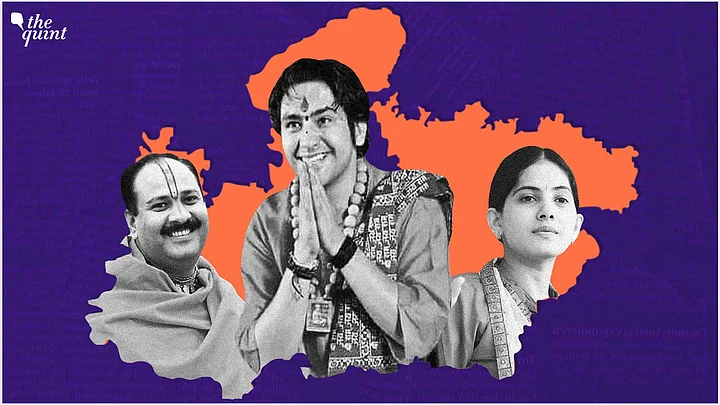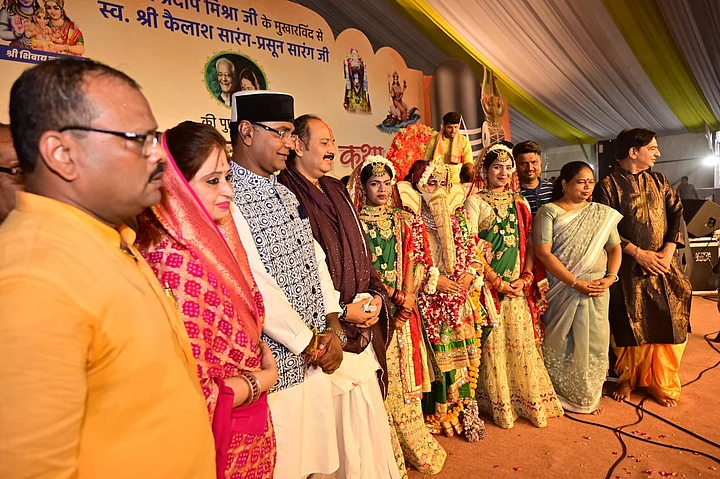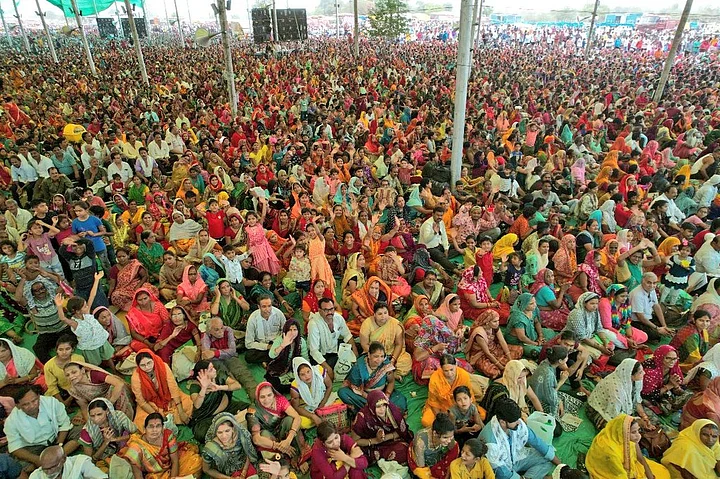As thousands sat under the scorching sun at Pandit Pradeep Mishra's 'Shiva Purana Katha' – organised by Madhya Pradesh's Minister of Medical Education Vishvas Sarang in Bhopal from 10 June to 14 June – the state once again found itself captivated by the presence of religious leaders, also known as 'babas'.
- 01/02
Madhya Pradesh's Minister of Medical Education Vishvas Sarang with Pandit Pradeep Mishra during the 'Shiva Purana Katha' in Bhopal.
(Photo: Twitter/ @VishvasSarang)

- 02/02
Thousands of people attended the Shiva Purana Katha organised by Sarang in Bhopal.
(Photo: Twitter/ @VishvasSarang)

Ahead of the Assembly elections in the state, these 'babas', who have amassed lakhs of followers over time, are being courted by politicians across party lines to host events in their constituency.
Be it Dhirendra Krishna Shastri, Pandit Pradeep Mishra, Sadhvi Ritambara, Rawatpura Sarkar, or Pandokhar Sarkar – they have become relevant yet again, as it is a common occurrence in the political landscape of MP every five years.
Political experts believe that through 'babas', parties are trying to push and cash in on the Hindutva tide. While some – such as Dhirendra Shastri and Pradeep Mishra – find themselves closer to the ruling Bharatiya Janata Party (BJP), the Congress doesn't want to be left far behind in its bid to not be seen as 'anti-Hindu'.
Over the years, MP has hosted quite a few religious preachers. But why is the state so fond of them – more so during elections?
'BJP, Congress Vying for Appointment With 'Babas'
"'Babas' and religious preachers have been actively involved in MP's politics since almost the beginning of Assembly elections in the state, albeit their ability to change voting patterns or results is very less than regarded," Vijay Dutt Shridhar, a journalist and founder of Madhav Sapre Museum of Newspapers and Research Institute, told The Quint.
In MP, the intervention of religious preachers in politics has a long history – from Swami Swaroopanand Saraswati, who was known well for his sway over former chief minister Digvijaya Singh, to Sadhvi Uma Bharti, who is a godwoman and was appointed as the chief minister of the state in 2003.
More recently, there has been an outpour of the general public in the events featuring Dhirendra Krishna Shastri or Pandit Pradeep Mishra. As per media reports, in February 2023, Mishra's event in the Sehore district was attended by around 20 lakh people. A stampede at the same event had killed a woman and injured many others.
Shastri's events have gained popularity beyond the state, too – in Chhattisgarh, Maharashtra, and Bihar.
With Assembly elections expected to happen in MP later this year, politicians seem to be competing to get an appointment with the 'babas' and secure their presence at public events. In the last few months, the current chief minister Shivraj Singh Chouhan, as well as the MP Congress president Kamal Nath, have taken 'blessings' from a 26-year-old, self-styled godman Shastri who claims to "predict the problems of devotees."
Speaking to The Quint, a senior journalist, who did not wish to be named, said:
"Shastri wasn't known to a majority of the state's people a year and a half ago. Today, his events witness lakhs of people pouring in. The situation is similar for other 'babas' as well. But what is most surprising is the competition among politicians to host these 'babas'; the urge is unprecedented."Senior Journalist
Another senior journalist from MP, Lajja Shankar Hardeniya, recounted to The Quint that 'babas' and their influence has often been used by political parties to manipulate votes and that official protocol was also flouted on certain counts.
"These spiritual gurus have had their pot of luck for decades in MP with every generation of political leaders bowing before them and their power to summon lakhs of people from all walks of life. It's a misconception; but so strong at the core that leaders have always fallen for it."Lajjashankar Hardeniya
"From Arjun Singh and Digvijaya Singh to the current leaders including Chief Minister Shivraj Singh Chouhan, it's a shame that educated people, youth, political leaders – all fall prey to these 'babas', completely disregarding the tenets of our Constitution," he added.
'Babas Wield Influence in 130 of Total 230 Seats'
In MP, 'babas' wield influence in Malwa, Nimad, Chambal, and Bundelkhand regions, even as the population settles around the banks of the revered Narmada river also known as Narmadanchal.
There are 66 seats in the Malwa-Nimad region, 34 in Chambal, and 30 in Bundelkhand. This means a total of 130 seats, as per media reports and political experts, are directly or indirectly influenced by these 'babas' and their events.
These areas cover more than what is needed to make or break a government in the 230-seat Legislative Assembly in MP.
While 'babas' like Shastri have gained the public eye after advocating Hindutva supremacy and "bulldozer raj" in line with the BJP's strategy in MP, others like Pradeep Mishra and Rawatpura Sarkar have used a softer approach to do the same. Prime-time slots in the vernacular media set the stage for them to further their agenda.
'Babas' Can Draw Crowds But Can They Sway Votes?
Despite their huge following and the notion of influencing voters, senior journalist-turned-commentator Arun Dixit refuted the idea that elections are affected by them.
"It might look like that 'babas' can make people cast their votes to any party but it's not entirely true. At the most, what they do is fan the emotions, help set the mood... but the main impact is by the leaders and the parties as well as the issues. One shouldn't think that half of MP will vote on the directions of these 'babas'."Arun Dixit
While most experts say that 'babas' and their charisma seem to work, in MP, both the Congress and the BJP have tried to use this superfluous notion to capitalise on the charged emotions of Hindutva.
Hardeniya further recalled:
"I remember when Digvijaya Singh was chief minister, he was a proud devotee of Swami Swaroopanand Saraswati, who wielded much influence politically as well as among the public till his last days. The BJP is now following suit by trying to capitalise on the following of the new-age 'babas'."
Experts also say that since these 'babas' pull crowds in lakhs, parties try to influence voting patterns through them. In constituencies that witness tight races between the Congress and the BJP, the softer nudge of these 'babas' often gives the edge that the candidates need to win.
In the 2018 Assembly elections, the difference between winning and losing candidates on 10 seats was less than one thousand votes while there were 18 seats with a winning margin of 2,000 votes, and 30 seats with a winning margin of 3,000 votes.
Another political commentator, on the condition of anonymity, said that political parties have identified five prominent 'babas' – Dhirendra Shastri, Pradeep Mishra, Pandokhar Sarkar, Rawatpura Sarkar, and Jaya Kishori – who they believe can help them cross the majority mark in the Malwa, Chambal, Bundelkhand, and Nimad regions.
While Shastri is popular in Bundelkhand and parts of Malwa, Mishra wields influence in the Malwa-Nimad region and parts of Narmadanchal.
Similarly, Rawatpura Sarkar is well known in Chambal and Bundelkhand while Pandokhar Sarkar is revered in the Malwa region besides influencing the general public in the Chambal and Bundelkhand regions.


